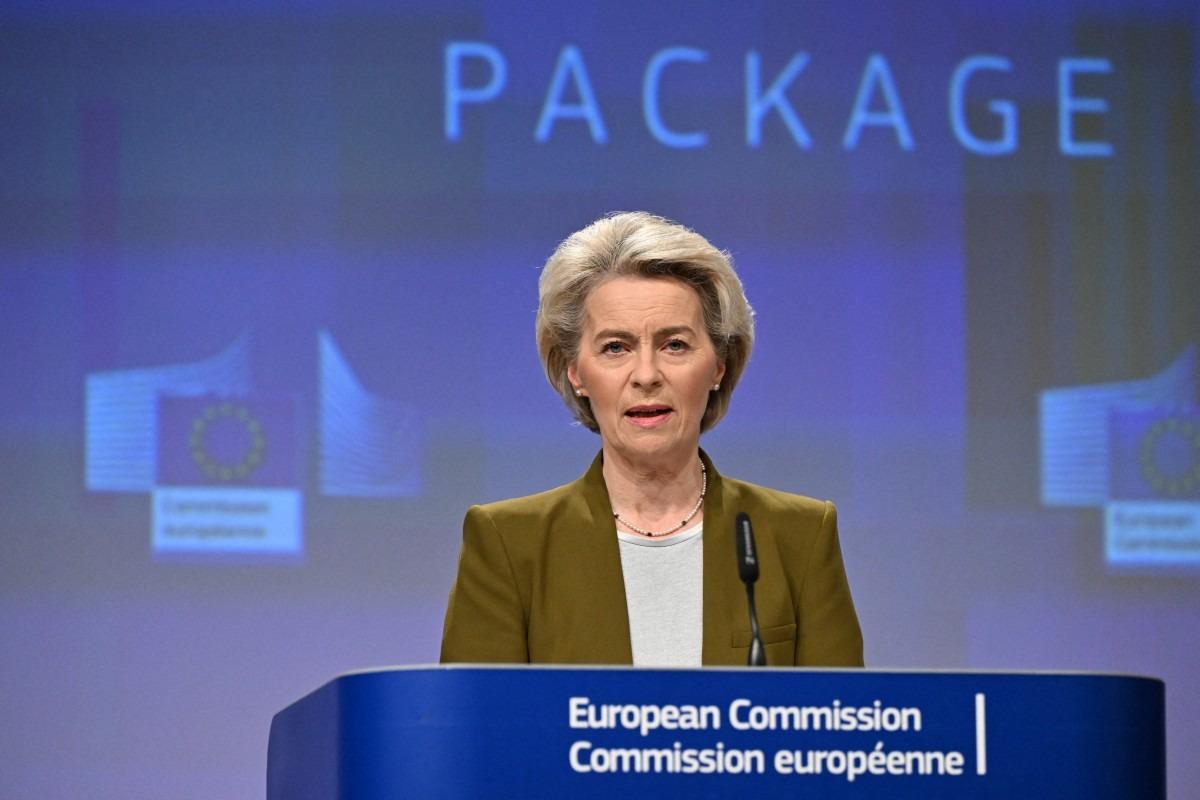 President of the European Commission Ursula von der Leyen holds a press conference on the 2023 Enlargement package and the new Growth Plan for the Western Balkans at the EU headquarters in Brussels, on Nov 8, 2023. (PHOTO / AFP)
President of the European Commission Ursula von der Leyen holds a press conference on the 2023 Enlargement package and the new Growth Plan for the Western Balkans at the EU headquarters in Brussels, on Nov 8, 2023. (PHOTO / AFP)
BRATISLAVA / BRUSSELS / KYIV - The European Commission gave its green light to start European Union accession negotiations with Ukraine and Moldova, the institution's President Ursula von der Leyen said here on Wednesday as she presented the 2023 Enlargement Package.
"Ukrainians are deeply reforming their country and preparing for accession," despite the ongoing conflict, she said, adding that "Moldova has undertaken significant reforms."
Ukraine has made "substantial progress," according to the Commission, on seven steps required for negotiations to open.
Ukraine's progress includes establishing a transparent pre-selection system for the Constitutional Court judges, a reform of the judicial governance bodies, the fight against high-level corruption, strengthening the country's institutional framework, limiting the influence of oligarchs, and aligning with the EU acquis body of common rights and obligations that is binding on all EU member states.
According to the Commission, Moldova made "important progress" on the nine steps required to start the talks.
Its progress includes a comprehensive justice reform, reform of its anti-corruption bodies, a deoligarchization action plan, fight against organized crime, adoption of a public administration strategy, reform of its public finance management, adoption of a legislation to reform public procurement
Its progress includes a comprehensive justice reform, reform of its anti-corruption bodies, a deoligarchization action plan, fight against organized crime, adoption of a public administration strategy, reform of its public finance management, adoption of a legislation to reform public procurement, enhancing the participation of civil society in the decision-making processes, and human rights protection.
The Commission recommended that Georgia be granted candidate status "on the understanding that the government takes important reform steps."
"Steps that mirror the genuine aspirations of the overwhelming majority of its citizens to join the European Union," von der Leyen said.
The Commission also recommended opening accession negotiations with Bosnia and Herzegovina "once the necessary degree of compliance with the membership criteria is achieved."
Ukraine applied for EU membership on Feb 28, 2022. Moldova and Georgia submitted their applications on March 3, 2022.
READ MORE: EU leader to visit Ukraine ahead of membership talks decision
Following the recommendation that accession negotiations should be open with Ukraine and Moldova, the Commission will issue a progress update in March 2024.
Ukrainian President Volodymyr Zelensky on Wednesday welcomed the recommendation by the European Commission to open negotiations with Ukraine on its European Union accession.
"This is a strong and historic step that paves the way to a stronger EU with Ukraine as its member," Zelensky wrote on social media platform X, formerly known as Twitter.
Kyiv looks forward to the decision of the European Council in December on whether to start membership talks with Ukraine, Zelensky said, stressing that the reform process in his country continues
Kyiv looks forward to the decision of the European Council in December on whether to start membership talks with Ukraine, Zelensky said, stressing that the reform process in his country continues.
READ MORE: Ukraine gets $23 billion in financial aid from EU since conflict
Also on Wednesday, the Slovakian government rejected a 14th package of military aid for Ukraine worth 40.3 million euros ($43.1 million), local media has reported.
The proposal for the aid was prepared by the former technocratic government.
The News Agency of the Slovak Republic reported that the military aid would have included ammunition, missiles, mortars and mines.
Slovakia has supported Ukraine with 13 packages of military aid worth 671 million euros since the beginning of the conflict.
However, the new Slovakian Prime Minister Robert Fico and his Smer party have repeatedly said that the government will stop military aid to Ukraine.
Nevertheless, the government has announced that military aid to Ukraine provided on a commercial basis by companies operating in Slovakia and the Czech Republic has no influence on the position of the Slovak government, and will continue.


